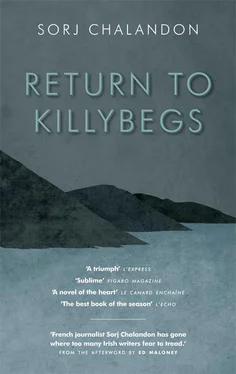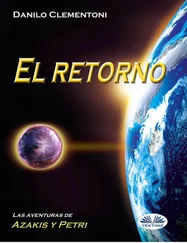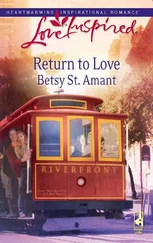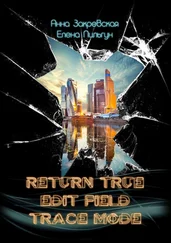Later that night, I passed Mike O’Doyle. He gave me a look, too. He went back to his table and watched me closely over his glass. Fourteen days later, it was him questioning me. Him asking me my surname, my first name and my date of birth for some ridiculous ceremony. He who was trying to make me talk.
— Since when have you been betraying us, Tyrone?
Poor kid. Standing totally rigid beside the old combatant he was trying to impress with his questions and his looks. Did he know already, that evening? I never asked him. Sheila was tipsy. At one point, she knocked into her chair. Mike got up, laughing, twirled through a few steps with her, and then took up his silent observation once more.
They know!
And it was suddenly obvious. They knew, all of them. This wedding was a trap. Sheila had dragged me here to make me talk. I mixed her gin with the end of my beer. I looked around at the other tables, the half-emptied glasses. I would help get rid of all that, I’d drink these leftovers on the sly.
No. They don’t know anything. It’s just a bad night, another night that has haunted me for the past twenty-five years. I’m no longer able to read people’s eyes, I don’t understand what their lips say. I take an embrace for an elbow and silence for disdain.
And yet, that night in the club, the looks became unreadable. Not those of the women, of distant friends, of lads met along the way, but those of my brothers in arms. For the first time in my life, I saw the IRA the way one sees the enemy. Because it was still there, the IRA. Despite the ceasefire, despite the peace process, despite our weapons destroyed one after another, it was still there. At that packed table, behind that bar, in that murmuring group, at the door, in the corridors, in that dark suit or that pale shirt. It was there, hostile. I felt its distrust. I recognized its behaviour, its manner, its way of shunning a man. For my entire life, I have suspected men. So many men. I would mutter their names in a friend’s ear, I’d point them out with a finger. I’d get down from my barstool or cross the street and I’d stand there, right in front of them, letting the suspect know he should be on his way. And today that man was me, Tyrone Meehan. On that evening of celebration I was being watched, they were keeping an eye on me. Leaning on Mickey’s shoulder, the Oyster pointed me out. I drank from a glass that wasn’t mine. A bitter-tasting liquor. I was hot, cold, could no longer feel my stomach or heart. I wanted to get sick. I was afraid. Just as Deirdre came to my table, I got up.
— Quick! A glass for Tyrone Meehan or he’s going to desert! shouted the bride.
A guy handed me a pint of the black stuff. Five more were waiting, flat from sitting too long. The Sheridan girl sat on my knee.
— Why the long face, Sheila’s wee man!
From calling me that in front of people, my wife had managed to spread the word around the neighbourhood, then the city and perhaps even the whole country. I apologized. You know, young lass, I’m eighty-one years old all the same. The days are long when you near the end.
— The end? But sure you’ll live to a hundred, Tyrone Meehan!
She laughed, and hugged Sheila who was making her way back to the table. I met Mike O’Doyle’s unpleasant look. A hundred? I could swear he shook his head to say no.

The following day was a Sunday. My mobile phone rang shortly before eleven in the morning.
— Tenor? It’s Dominik.
I was in the living room reading the Sunday World . I spilled my coffee.
— Cemetery at midday.
Not another word. He hung up.
It had been a long time since I’d seen the red-haired handler. A long time, too, since I’d been to Henry Joy McCracken’s grave. I got up without a word. Sheila was at Mass. I no longer went. They had forbidden me Communion so I refused them my prayers. I took a taxi, not my car. Sunday. The rain, the grey facades of the city’s north side. I went around and around on foot, the newspaper in my hand to give me a role. I had put on my cap, my dark glasses and a scarf pulled up over my mouth.
On my third circuit of the neighbourhood, the red-haired cop was standing there against the railings. Once he saw me, he got into a car and opened the passenger door. I looked around, the misery of the seventh day. I got in and he drove off.
I instinctively lowered the sun visor to hide my face. He headed for the motorway. I was angry. We had said that I’d be the one to call. Me, always. No question of ringing for me like a servant. I wanted him to speak first. I turned towards him, he was watching the road.
— It’s over, Tyrone.
My breath was cut short.
— What’s over?
Still that absent gaze.
— You, me, Dominik, Tenor, all that shit.
I let myself sink back into the seat. I had forgotten my seatbelt, I put it on. I think I was smiling. Over. So that was it. I was going to live again.
— And why is it you who’s come to tell me this? Waldner isn’t around?
Silence. The cop jerked his head.
— You know, Tyrone, the English…
— What about them?
— He’s gone back to London. His mission is over.
— And Honoré?
— Gone back to his studies.
All the better. Two fewer of them.
— And me? What’ll become of me?
— We have a deal to offer you, Tyrone.
— A deal?
We were right in the middle of a Protestant enclave. The British flag was painted all over the walls. Pictures of William of Orange, conqueror of the Catholic armies in 1690. Some paramilitary frescos in homage to their battle cry: ‘No surrender!’
The handler stopped the car beside a park.
— Let’s walk for a bit, Tyrone.
My heart was in turmoil, my legs jelly. And I was so thirsty. My palate felt like cardboard and my tongue was rough. I had no voice left. I was waiting. I watched his slow steps, the way he lit a cigarette, handed me one, met my eyes over the flame.
— You’re going to have to leave, Tyrone.
— What’s going on?
A very old man’s voice.
— First, we’re going to put you under cover somewhere and then we’ll extract you.
— Answer me, for fuck’s sake. What’s going on?
The handler inhaled the smoke. He was buying time.
— We’re going to provide you with a new identity. You’ll also get a house and £150,000, to keep you going a bit while waiting.
I caught him by the sleeve.
— I don’t want any of your money. I’m Irish and I’m staying in Ireland.
— You don’t have a choice, the handler replied gently.
I looked at him. I’d never seen him so calm.
— My cover is blown, is that it?
— That’s it.
I whacked the park railing with my newspaper.
— Fuck! But how is this possible? What happened?
— The ceasefire has moved the boundaries…
I grabbed him by the shoulders. He was taller than me, younger than me, he could have thrown me to the ground with a look, but he let himself be manhandled.
— You didn’t do that? Damn it! You haven’t sold me?
— Not us, no. Not the Ulster police, Tyrone.
— MI5? That dog, Waldner?
The policeman shook me off. He put his hands in his pockets.
— What did you think would happen, Tyrone? Really? How did you think this was going to end?
— Why the fuck couldn’t you leave me in peace?
— Precisely because this is peace, Tyrone. You were useful during wartime, you’ll be useful in peacetime, too.
— I don’t understand any of this! Any of it!
I was shouting. He calmed me with a hand on my arm.
— Sinn Féin is reaping the fruits of the peace process. You’re scoring points everywhere, you’re going to become the first political party of Northern Ireland, and that, well, that’s pissing them off, Tyrone.
Читать дальше













